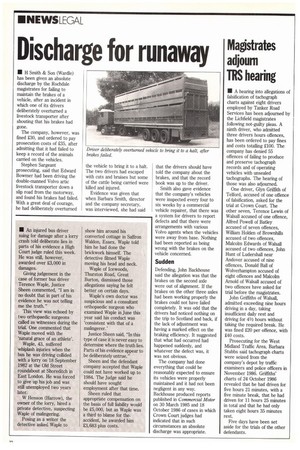Discharge for runaway
Page 24

If you've noticed an error in this article please click here to report it so we can fix it.
• H Smith & Son (Wardle) has been given an absolute discharge by the Rochdale magistrates for failing to maintain the brakes of a vehicle, after an incident in which one of its drivers deliberately overturned a livestock transporter after shouting that his brakes had gone.
The company, however, was fined £30, and ordered to pay prosecution costs of £35, after admitting that it had failed to keep a record of the animals carried on the vehicles.
Stephen Sargeant prosecuting, said that Edward Bowmer had been driving the double-manned Volvo artic livestock transporter down a slip road from the motorway, and found his brakes had failed. With a great deal of courage, he had deliberately overturned the vehicle to bring it to a halt. The two drivers had escaped with cuts and bruises but some of the cattle being carried were killed and injured.
Evidence was given that when Barbara Smith, director and the company secretary, was interviewed, she had said that the drivers should have told the company about the brakes, and that the record book was up to the driver.
Smith also gave evidence that the company's vehicles were inspected every four to six weeks by a commercial vehicle repairer, that there was a system for drivers to report defects and that there were arrangements with various Volvo agents when the vehicles were away from base. Nothing had been reported as being wrong with the brakes on the vehicle concerned.
Sudden
Defending, John Bacldiouse said the allegation was that the brakes on the second axle were out of alignment. If the brakes on the other three axles had been working properly the brakes could not have failed completely. It was odd that the drivers had noticed nothing on the trip to Scotland and back, if the lack of adjustment was having a marked effect on the braking efficiency. It suggested that what had occurred had happened suddenly, and whatever the defect was, it was not obvious.
The company had done everything that could be reasonably expected to ensure its vehicles were properly maintained and it had not been negligent in any way. Bacldiouse produced reports published in Commercial Motor on 30 March 1985 and 18 October 1986 of cases in which Crown Court judges had indicated that in such circumstances an absolute discharge was appropriate.




































































































































